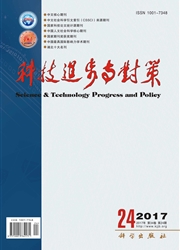

 中文摘要:
中文摘要:
首先,将技术创新划分为技术研发和技术转化两阶段,应用 CES 生产函数分阶段推导环境规制与技术创新的数理关系。其次,根据污染排放强度将中国制造业28个细分行业划分为重度污染型、中度污染型及轻度污染型3种类型,以2003-2012年行业面板数据为样本,构建分阶段分行业的计量回归模型进行环境规制对技术创新的实证检验。数理推导证明:环境规制与企业技术研发和技术转化在数理上均存在正相关关系。实证检验发现:①环境规制对中国制造业技术研发专利成果和技术转化新产品生产具有显著促进作用,波特假说在制造业整体上得到验证;②环境规制对中度污染行业、轻度污染行业的技术创新具有显著促进作用,但对重度污染行业的影响并不显著,波特假说存在明显的行业异质性。最后,针对环境规制对技术创新影响的阶段性和行业异质性提出了相关政策建议。
 英文摘要:
英文摘要:
First ,this paper divides technology innovation into tw o stages ,including technology research & development and technology transfer ,and applies CES production function to deriving the mathematical relationship between environmental regulation and technology innovation in different stages .According to the pollution emission intensity ,this paper then di‐vides China's 28 manufacturing sub‐industries into three types ,including heavy‐polluting industries ,moderate‐polluting in‐dustries and mild polluting industries .Based on the industrial panel data 2003 -2012 ,this paper builds an econometric re‐gression model and empirically tests the heterogeneity effect of environmental regulation on two‐stage technology innova‐tion .The mathematical derivation proves that mathematical relationship between environmental regulation and technology innovation is positive at both stages .The empirical test turns out that :(1) environmental regulation significantly pro‐motes the production of patents at technology research & development stage and new products at technology transfer stage ,w hich verifies the Porter Hypothesis in China's manufacturing industries ,and (2) environmental regulation signifi‐cantly promotes technology innovation only in China's moderate‐polluting and mild‐polluting manufacturing industries , suggesting that the Porter Hypothesis various across industries .At last ,this paper provides corresponding policy recom‐mendations regarding the heterogeneity effect of China's manufacturing industries .
 同期刊论文项目
同期刊论文项目
 同项目期刊论文
同项目期刊论文
 期刊信息
期刊信息
